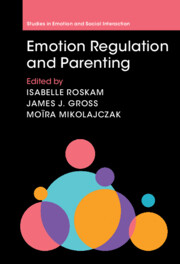Book contents
- Emotion Regulation and Parenting
- Studies in Emotion and Social Interaction
- Emotion Regulation and Parenting
- Copyright page
- Contents
- Figures
- Tables
- Contributors
- Preface
- Part I Conceptual Foundations
- Part II Influence of Parents’ Emotion Regulation on Parenting
- Part III Influence of Parenting on Child Emotion Regulation
- Chapter 7 Parental Coregulation of Child Emotions
- Chapter 8 Parental Assistance with Children’s Extrinsic Emotion Regulation across Development
- Chapter 9 Parental Socialization of Children’s Emotion and Its Regulation
- Part IV Current Trends
- Index
- Studies in Emotion and Social Interaction
- References
Chapter 9 - Parental Socialization of Children’s Emotion and Its Regulation
from Part III - Influence of Parenting on Child Emotion Regulation
Published online by Cambridge University Press: 05 January 2024
- Emotion Regulation and Parenting
- Studies in Emotion and Social Interaction
- Emotion Regulation and Parenting
- Copyright page
- Contents
- Figures
- Tables
- Contributors
- Preface
- Part I Conceptual Foundations
- Part II Influence of Parents’ Emotion Regulation on Parenting
- Part III Influence of Parenting on Child Emotion Regulation
- Chapter 7 Parental Coregulation of Child Emotions
- Chapter 8 Parental Assistance with Children’s Extrinsic Emotion Regulation across Development
- Chapter 9 Parental Socialization of Children’s Emotion and Its Regulation
- Part IV Current Trends
- Index
- Studies in Emotion and Social Interaction
- References
Summary
The development of children’s emotions and emotion-related self-regulation are involved in many important developmental outcomes. The purpose of this review is to examine the ways that parents socialize their children’s experience and regulation of emotionality. We begin by presenting our theoretical model of parental socialization of emotions. Next, we review literature on three aspects of emotion-related socialization practices including (1) socializers’ reactions to children’s emotions, (2) socializers’ own expressions of emotions and regulation, and (3) socializers’ discussion of emotions. Complexities in these relations, such as potential bidirectional relations and moderators, are considered. Specifically, we discuss the role played by contextual factors such as culture/race, child characteristics, and global parenting behavior in the relation between emotion-related socialization behaviors and children’s emotion-related outcomes. We conclude with a review of intervention studies that sought to improve children’s emotional competence through changes in parenting behaviors and future directions for research.
Keywords
- Type
- Chapter
- Information
- Emotion Regulation and Parenting , pp. 166 - 186Publisher: Cambridge University PressPrint publication year: 2023



